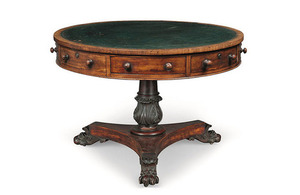What the Dickens? Author's study table at risk of export
Minister for Arts steps in to prevent William IV mahogany table from export

Dickens table
A study table used by Charles Dickens, one of Britain’s most famous novelists, is at risk of being exported from the UK unless a buyer can be found to match the asking price of £67,600.
Minister for Arts, Heritage and Tourism Michael Ellis has placed a temporary export bar on the William IV mahogany table to provide an opportunity to keep it in the country.
Estimated to have been made in around 1835, the round table has a revolving drum top above eight drawers and is covered in green leather. It was used by Dickens during most of his career – first in his London home at Devonshire Terrace; then his offices on Wellington Street where he published Household Words and All the Year Round; and finally in his library at Gad’s Hill Place in Higham, Kent where he died in 1870.
It is also known to have contained the keys to his wine cellar, and appears to be one of the very first objects to have been formally labelled with Dickens’ name; one drawer contains an oval silver plaque stating that the table stood in his library.
Experts believe that the table was bequeathed to Dickens’ eldest son Charley, before it was acquired by his younger brother Sir Henry Fielding Dickens at the sale of Gad’s Hill Place in 1878. It remained in the possession of Dickens’ descendants until it was sold at auction in December 2017.
Michael Ellis, Minister for Arts, Heritage and Tourism, said:
As one of Britain’s most famous novelists, it is only right for there to be great expectations on us to protect Dickens’ study table for the benefit of the nation.
This substantial piece of furniture was a central feature in whatever household he lived in through most of his adult life. It is another significant item related to one of Britain’s cultural icons.
The decision to defer the export licence follows a recommendation by the Reviewing Committee on the Export of Works of Art and Objects of Cultural Interest, administered by The Arts Council. They made their recommendation on the grounds that its departure from the UK would be a misfortune due to its close connection with our history and national life.
Reviewing Committee on the Export of Works of Art and Objects of Cultural Interest member Christopher Rowell said:
On one occasion, when he was abroad, Dickens precisely described this table and its position in his Library so that a friend could locate a set of keys in one of its drawers. His art criticism as well as his descriptive writing reveal his aesthetic sensibility and this elegant, if workmanlike, leather-covered mahogany library table was clearly valued by him. Its associations are of considerable interest to lovers of Dickens’ novels and writings.
The decision on the export licence application for the William IV mahogany table will be deferred until 26 October 2018. This may be extended until 26 January 2019 if a serious intention to raise funds to purchase it is made at the recommended price of £67,600.
Organisations or individuals interested in purchasing the table should contact the RCEWA on 0845 300 6200.
ENDS
Notes to editors
Details of the table are as follows:
William IV mahogany table, previously owned by Charles Dickens
Retailed or made by M. Wilson (the name impressed on one drawer)
Estimated to have been built in around 1835, London
Measured at 74cm high and 107.5cm diameter
A drawer contains an oval silver plaque which bears the hallmark of Robert Hennell, London, and the date cypher for 1873, and is engraved: ‘Charles Dickens’ Library Table / which stood in / his Library at Gad’s Hill.’
An image of the table can be downloaded here.
The Reviewing Committee on the Export of Works of Art and Objects of Cultural Interest is an independent body, serviced by The Arts Council, which advises the Secretary of State for Digital, Culture, Media and Sport on whether a cultural object, intended for export, is of national importance under specified criteria.
The Arts Council champions, develops and invests in artistic and cultural experiences that enrich people’s lives. It supports a range of activities across the arts, museums and libraries – from theatre to digital art, reading to dance, music to literature, and crafts to collections. www.artscouncil.org.uk.